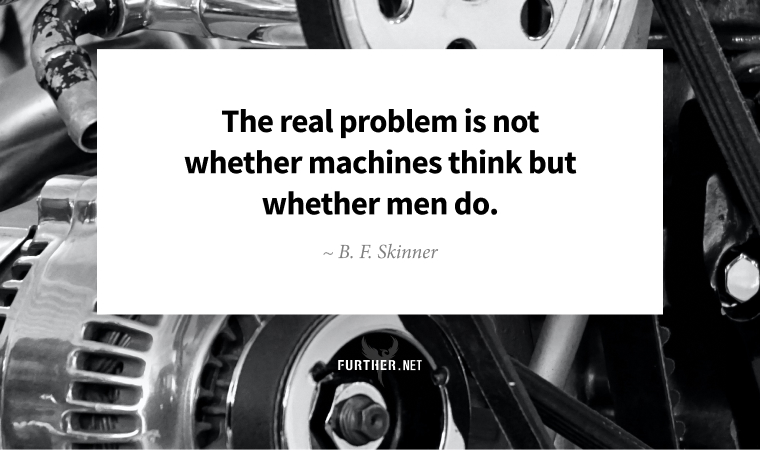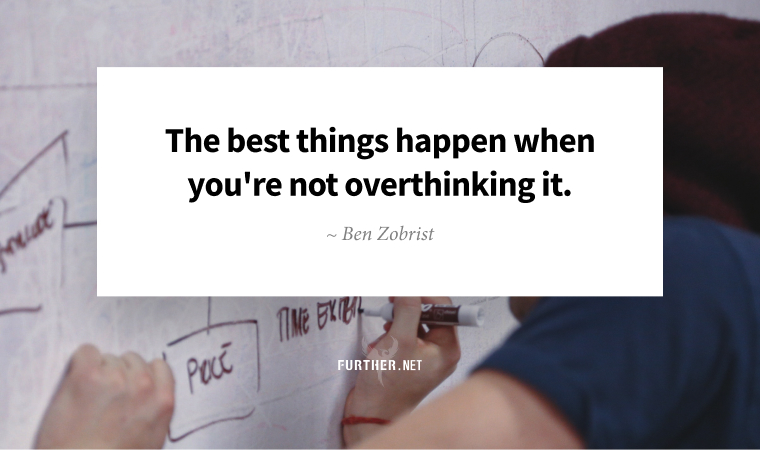Here Come the Robots 
We've been hearing for years how artificial intelligence is about to disrupt society and put people out of work. We've been hearing that for so long that it almost seemed overblown -- some elaborate vaporware that's nothing but hype. If you've felt that way, I'm afraid it wasn't hype. In Ernest Hemingway's The Sun Also Rises, drunken war veteran Mike Campbell is asked how he went bankrupt. "Two ways," he answers. "Gradually, then suddenly." That's where we're at with AI. The gradual happened for a long time, but now the changes are happening suddenly, and accelerating. Most Further readers likely feel relatively safe from automation. Unfortunately, that's a dangerous assumption. White-collar workers, armed with college degrees and specialized training, once felt relatively safe from automation. But recent advances in A.I. and machine learning have created algorithms capable of outperforming doctors, lawyers and bankers at certain parts of their jobs. And as bots learn to do higher-value tasks, they are climbing the corporate ladder. The pandemic became the perfect catalyst for implementation of AI, automation, and robotics by companies that had been putting it off. The acceleration has accelerated. The most powerful firms in the world -- Amazon, Apple, Google, Facebook, and Microsoft -- are all algorithmically driven. And they are taking market share away from other businesses at an alarming rate. Plus, you've got an array of startups using AI to disrupt entire industries. But the biggest mainstream change is coming because "normal" companies are taking this disruption to "business as usual" to also implement these technologies. And you can bet that they're going to eliminate human jobs in the process. Executives generally spin these bots as being good for everyone, "streamlining operations" while "liberating workers" from mundane and repetitive tasks. But they are also liberating plenty of people from their jobs. Many corporate executives had been hesitant to implement automation due to the backlash over layoffs, much as with outsourcing in the 1990s. But given that millions of people are already out of work and many businesses are struggling to stay afloat, "they don't really care, they're just going to do what's right for their business." That's the key right there. If you own the business, automation is awesome. If you don't, not so much. Food for thought. The Robots Are Coming for Phil in Accounting (New York Times) That Last Set Feeling When the options for things to do became severely limited, working out actually felt like a treat. And it proved what coaches and doctors have lectured us about our entire lives: Exercise adjusts your mood for the better. How Daily Exercise Became the Last Great Indulgence (Elemental) Nomad Suitcase Who could blame you if you decide to head out for some extended travel time when the pandemic clears? From clothes to tech to toiletries and more, here's a list of 81 items for your minimalist carry-on travel. The Ultimate Digital Nomad Packing List | 81 Items For Minimalist Carry On Travel (YouTube) This is Your Brain on Retirement It's something I never considered when I was younger and thought of retiring someday, but we keep hearing about this. Emerging research suggests that retirement could lead to a decline in your cognitive function, says gerontologist Ross Andel. Think retirement is smooth sailing? A look at its potential effects on the brain (TED) Thinking With Your Stomach The connection between gut health and brain health is becoming increasingly hard to ignore. A new study may have unlocked how to leverage the connection to treat brain conditions that affect social behavior. Gut Microbes Could Be The Future Of Brain Health (Impact Lab) Down below Trudi offers more ways to escape the curse of overthinking. And if this week's Flashback had been written these days, the chorus would be "I might like you better if I slept." Keep going- Brian Clark P.S. Share this issue of Further with friends, and earn cool Further gear. It's easy ... just use these links that contain your unique referral code: Twitter | Facebook | LinkedIn | WhatsApp | Email Make Better Decisions, Faster 
By Trudi Roth Your brain is powerful, which is why it's often compared to a supercomputer. This implies it instantly accurately processes information to determine ideal outcomes. Now, think about what you put into even a simple decision like what's for dinner. That easily takes me a half-hour to consider who I'm feeding, what's in the fridge, what we're not sick of, and so on. Back to that computer comparison. Your brain runs on an antiquated default operating system with primal neurological wiring designed to keep you "safe." Add in a lifetime of social conditioning, and overanalyzing becomes natural. However, it's not necessarily inevitable. From meditators to the military, there are tricks of the trade to gain agency over your thoughts and actions. This Indecision's Bugging Me While there's nothing wrong with being analytical, there's a fine line between assessing a situation and overthinking it. Studies show excessive rumination can lead to depression and anxiety. Breaking a habit of second-guessing and obsessive thinking starts with learning how to trust your gut. The gut, literally, contains many of the same neurotransmitters as the brain; in fact, there are two neural pathways going from the gut to the brain (and only one going the other way). The gut sends information to the brain and you can use gut and intuition to filter the decisions that you send up to the brain for processing. So, rather than analyzing 100 possibilities, you narrow it down to one or two, and analyze those. In other words, instinctual decision-making comes naturally. Using it wisely is a skill you can cultivate. Fight the Overthinking Urge One way to manage your mental state is through meditation. By quieting your mind, you release limiting negative thought patterns and gain focus and awareness. This makes the next right action accessible and clear. While a gradual, meditative approach works for some, others may prefer a mental shortcut like an OODA Loop. Created by US Air Force Colonel John Boyd, it's a four-part process that removes fear from ambiguity and uncertainty and expedites decision-making. - Observe: Quickly take in your environment, relevant information, and cues. Ignore anything unrelated.
- Orient: Identify barriers to progress, including cognitive biases and shortcuts, to see reality clearly.
- Decide: At this point, there are no surprises. You have what's necessary to make an informed decision.
- Act: Take action by testing your decision out. Remember, it's all about progress, not perfection.
And repeat -- that's the loop part. You don't have to be pressured like a fighter pilot to use Boyd's heuristic. It applies to any situation (even deciding what's for dinner) by prioritizing decisiveness, initiative-taking, and autonomy. OODA Loop or Om, pick what appeals to you. Either way works; so don't overthink it. The OODA Loop: How Fighter Pilots Make Fast and Accurate Decisions (Farnam Street) Overthinking is the bane of decision-making. This how to cut back on constantly analyzing things (Fast Company) further: flashback 
Romeo Void - Never Say Never
Benefactor, 1982 The bass line, the sax, the video spoof of Godard's Breathless, and the amazing voice of an empowered 80s woman. Never Say Never has it all ... I always love when this song pops up on a playlist. (YouTube) further: sharing Would you do me a favor and share Further with a friend? If so, you can earn cool Further gear when people subscribe thanks to your share.  Simply use these links that contain your unique referral code: Twitter | Facebook | LinkedIn | WhatsApp | Email You can also share wherever you like by copying and pasting your unique referral link: https://further.net?rh_ref=7fda93ad Thank you for sharing Further! | 

No comments:
Post a Comment